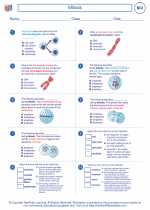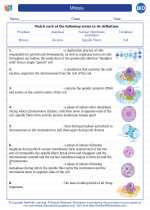Variation
Variation refers to the differences that exist among individuals within a species. These differences can be observed in traits such as physical appearance, behavior, and biochemical characteristics. Variation is a fundamental concept in biology and is essential for the process of evolution.
Sources of Variation
Variation can arise from several sources:
- Genetic Variation: Differences in the genetic makeup of individuals due to mutations, genetic recombination, and gene flow.
- Environmental Variation: Differences in traits that are influenced by environmental factors such as nutrition, climate, and exposure to toxins.
- Developmental Variation: Differences that arise during the development of an organism, leading to variations in traits.
Significance of Variation
Variation plays a crucial role in the survival and adaptation of species. It provides the raw material for natural selection, allowing organisms to better fit into their environment. Additionally, variations contribute to the diversity of life forms on Earth.
Types of Variation
Variation can be categorized into different types:
- Morphological Variation: Differences in physical characteristics such as body size, shape, and coloration.
- Behavioral Variation: Differences in patterns of behavior and social interactions among individuals.
- Genetic Variation: Differences in the DNA sequences and genetic makeup of individuals.
- Physiological Variation: Differences in metabolic processes, hormone levels, and other physiological traits.
Studying Variation
To understand and study variation, biologists use various methods and tools, such as:
- Observational Studies: Observing and documenting variations in traits within a population or species.
- Genetic Analysis: Using techniques such as DNA sequencing and genetic mapping to study genetic variation.
- Experimental Manipulation: Conducting controlled experiments to understand the effects of environmental factors on variation.
- Statistical Analysis: Applying statistical methods to quantify and analyze variation within and among populations.
Study Guide
To effectively study the concept of variation, consider the following key points:
- Understand the different sources of variation and provide examples for each.
- Explain the significance of variation in the context of evolution and species adaptation.
- Identify and describe the types of variation found in living organisms.
- Discuss the methods and tools used by biologists to study variation.
- Explore real-world examples of variation in different species and ecosystems.
[Variation] Related Worksheets and Study Guides:
.◂Biology Worksheets and Study Guides High School. Mitosis

 Worksheet/Answer key
Worksheet/Answer key
 Vocabulary/Answer key
Vocabulary/Answer key
 Vocabulary/Answer key
Vocabulary/Answer key
 Vocabulary/Answer key
Vocabulary/Answer key
